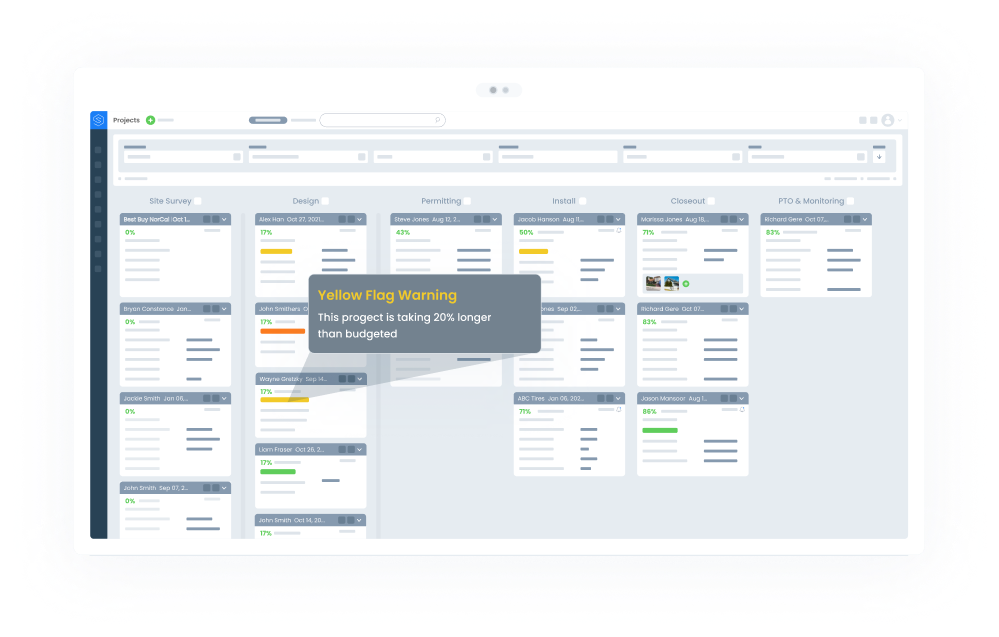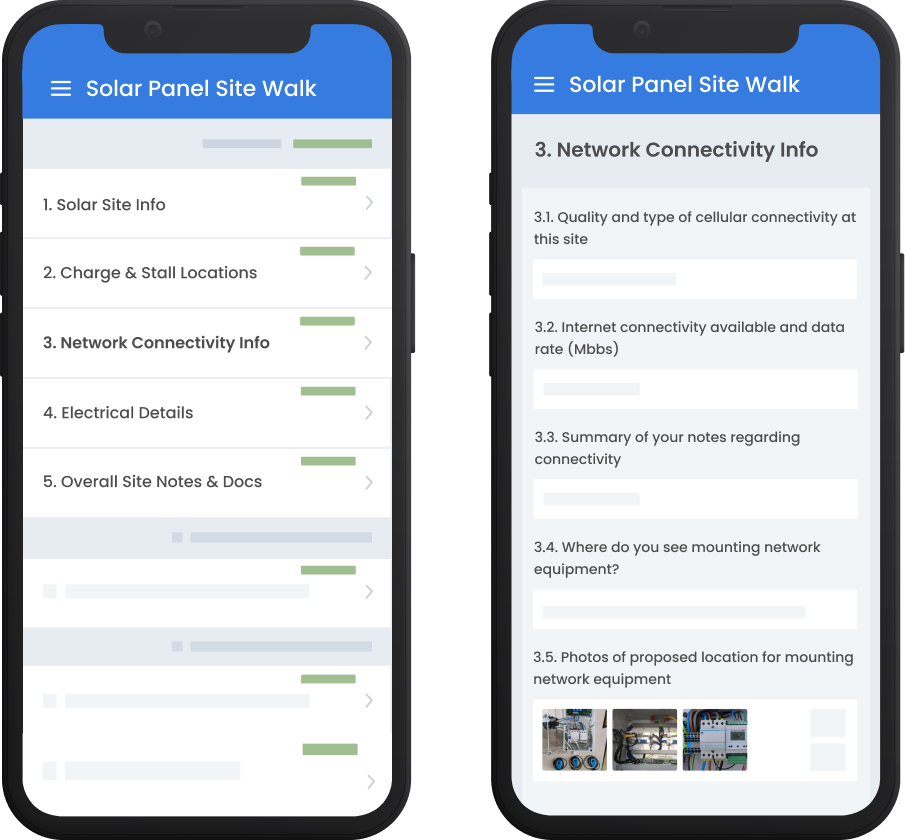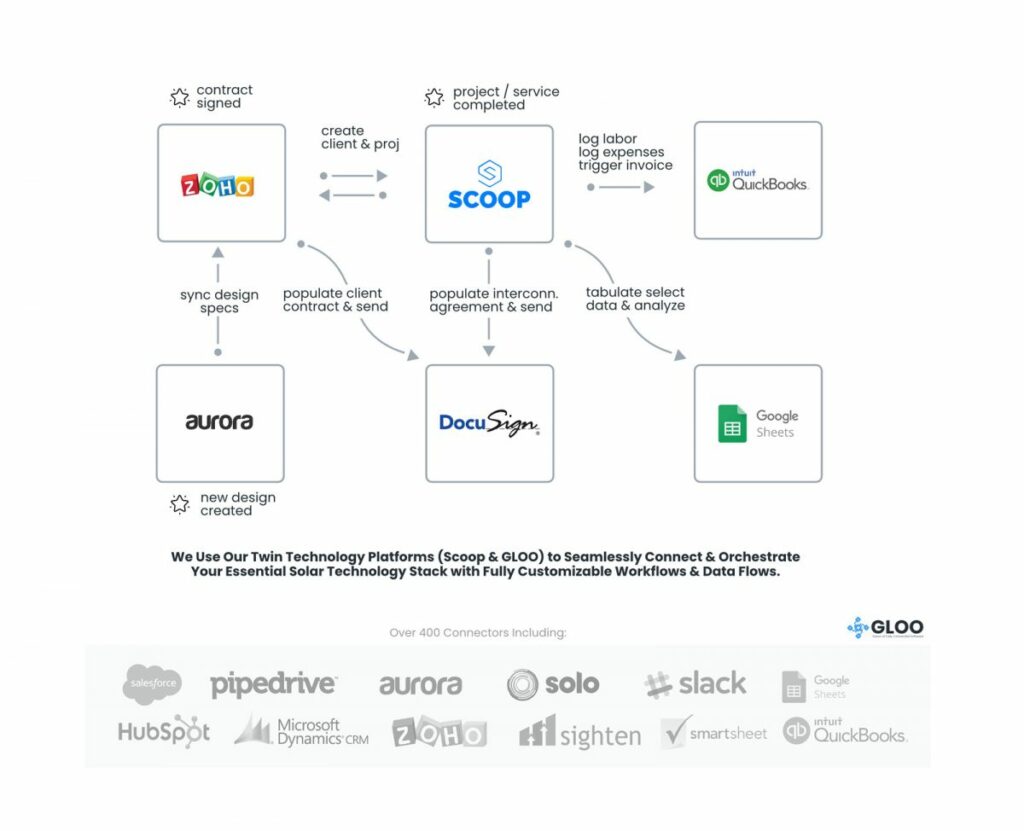What is the advantage to using field service management software (FSM)? What key features should you look for? What are the benefits to both your field technicians and office employees? How does FSM software assist with managing work orders, service requests, time tracking, scheduling, and dispatch?
Read on for your comprehensive guide on field service management solutions for growing solar companies.
What is Field Service Management Software (FSM)?
Field service software, also referred to as a field service management system or FSM, is used for scheduling customer job visits as well as to dispatch field technicians, evaluate job histories, and interpret overall business performance. Strategic FSM tools also provide advanced communication capabilities for relaying information between field workers and back office teams.

Why Use Field Service Management Solutions?
Field service management involves a lot of moving parts which is why a specialized software platform is often used to organize, evaluate, and execute field related tasks and projects. From work order management, to scheduling and dispatching jobs, managing customer data, and end-to-end project management, mobile work process management and automation (mPMA) software such as Scoop is transforming solar field operations.
Who Should Implement Field Service Software?
Field service management software should be used by businesses that offer in-field services, including solar panel, battery storage, and EV charging installers, construction workers, electricians, landscapers, technicians, and any other hybrid worker who shifts between offsite and onsite locations.
Field service management software streamlines day-to-day operations for growing solar companies and others by improving communication between field service workers, dispatch, management, and customers. In a field service industry such as solar energy, project managers can use field service management solutions to efficiently schedule, manage, and track in-field technicians and overall project progress.
Key Features of Field Service Software
There are several advantages of field service management software. In order to mobilize, automate, and streamline your solar operations, consider field service software with features like work order and project management, dispatch and scheduling, mobile app access and functionality, customer relationship management, ability to integrate with other software solutions, and data reporting and analytics.
Manage Work Orders
Arguably one of the most fundamental features of field service software is the ability to track and manage work orders in real-time. The Scoop platform gives you full control over assigning project leads, crew members, creating custom project phases, automated tasks, and more. These features make work order management seamless.
Once project phases are configured and team members have been assigned, Scoop’s Project Tracker Live™ feature makes it easy for your teams, from sales and site survey, to solar design, permitting, and installation to access a reliable status of your projects. Unlike generic office-based project management tools that rely on you to feed in data from multiple sources, Scoop’s Project Tracker Live is cloud based and directly linked to the underlying phases and work activities of your projects – meaning your project progress reporting is always up-to-date, automatically and effortlessly.

Schedule and Dispatch Jobs
Your field service management tool should offer the ability to schedule your field technicians and dispatch them as needed. Particularly for growing solar companies, it is important for your field service management solution to send real-time alerts to your project manager or field operations admin as new site surveys, field installations, or job closeouts are required, allowing them to quickly evaluate who is best positioned to take on this assignment based on crew availability and location.
The calendar and scheduling features of the Scoop platform are fully integrated, meaning your technicians and overall team are not required to access other tools for scheduling or viewing project and work order details. Assign administrative and scheduling roles to grant specific employees access to all calendars across your organization. Users with these permissions can view free and busy time slots, schedule hourly or multi-day events for others, as well as view the status of work as it is completed.
Access in the Field
Given the mobile and remote nature of solar and renewable energy work orders, software access on a mobile device is another important consideration. Not only should calendars and relevant schedules be accessible in the field, but the related work order, checklist of instructions, and job site photo capture must also work smoothly on the mobile app. An additional factor to consider of your field service software is whether or not the mobile app can function without a reliable internet connection. Solar installation and service companies need a field service software that is designed for mobile field work, provides transparency and flexibility, and allows field service technicians to plan ahead.
The Scoop Solar mobile app provides on-the-go access to in-field and remote workers, meaning site surveyors and field technicians that have just arrived at the job site can click through the mobile app calendar event to access customer data, work order details, and more. As the site survey is complete, field workers can upload relevant data, photos, and videos on the fly. The mobile field service app is cloud based, ensuring this information is saved and synced from the mobile app back to your office staff to assess next steps.

Manage Customer Data and Communication
In any business, it is important to understand who your customers are, what they need, and how to cater to them. This can be challenging during fast periods of growth as you sign on more customers. Ideally, your field service software should include the ability to store this relevant client data – client name, site addresses, customer history, upcoming installation and service dates, the assigned technician, and payment schedules, for example.
The Scoop platform keeps the customer experience front-and-center. As projects progress, create and send professional PDF progress reports directly to customers. Include your branding and logo and configure the title page, report layout, content, and more. Showcase checklist items, photos, comments, and tasks where relevant and use Scoop Auto Actions™ to automatically email PDF reports to clients at key project milestones.
Integrate with Other Software Tools
It is very likely that your field service management platform is not the only software tool used by your business. You may also have an existing customer relationship management (CRM), solar design, scheduling, inventory management, or invoice and payment processing software tools in place. Rather than tear up your existing tech stack and search for an elusive “all-in-one” platform, your team should consider field service software that is able to integrate with your other platforms. This approach allows you to optimize your workflows with a best of breed software stack.
As you scale your solar operations, you must ensure your teams make the most of existing data, processes, and software tools. For this reason, Scoop offers a fully managed and hosted integration service. GLOO™ integrations mean powerful access to all of your favorite platforms and APIs, so that you can have your tech stack provide an unparalleled user experience.
Review Analytics and Reporting
In order to assess overall business performance, critical functions, or areas of opportunity, you must have reliable data. As projects are sold, executed, and invoiced, it is beneficial to evaluate this performance with solar service analytics and reporting.
Scoop’s LOOXY™ analytics platform enables growing solar installation and service companies to visualize everything from deals and contract value in various stages of your pipeline, sales rep monthly commission reports, number of service visits in a given time period, invoicing timelines for each project, and more. Drag and drop reports make it fast and easy for your teams to leverage these insights in order to make more informed decisions surrounding your projects, materials, process bottlenecks, and resourcing.
Benefits of Field Service Software Solutions
While field service management can be complex, investing in field service software provides some substantial benefits to field teams and solar companies, including:
- Optimize schedules for field workers and clients, project timelines, and more
- Increase communication and transparency between field teams, office staff, and customers
- Automate workflows, project templates, and task assignments
- Streamline communication, data, documents, and schedules
- Reduce manual systems, data entry, and redundancies in software tool overlap
- Improve visibility and operations by collecting, tracking, and analyzing crucial data such as job
- completion times, field notes, and more
- Create more time for field teams to focus on in-field work by removing repetitive and manual admin processes
All in all, field service management software improves agility and efficiency for growing solar companies. FSM schedules and dispatches technicians, tracks project progress, and allows field workers to access their jobs through a mobile app for better time management. You can also set key performance indicators (KPIs) within the software to help your field service team track and manage annual goals. To learn more about field service management with Scoop, start the conversation.

Field Service Software FAQs
What is field services software?
Field service management software (FSM) is used in the field service industry to dispatch and schedule field workers, streamline service operations, and enable mobile field service, typically through a mobile app.
What is the best field service software?
The best field service software for your business will depend on your unique requirements, existing software tools, user experience, and customer workflows. In order to find the best field service management software for your business, keep reading to determine the key features to look out for.
What are key features of a field service management solution?
Field service software systems should be cloud based and combine data and customer management, scheduling and dispatching the appropriate field service technicians to their jobs, accessibility through a mobile app, and visibility into job status. A good field service software tool provides service operations features like scheduling, project tracking and time tracking, customer support, and service requests. Your field service management solution may also offer inventory management, gps tracking, and payment processing.


